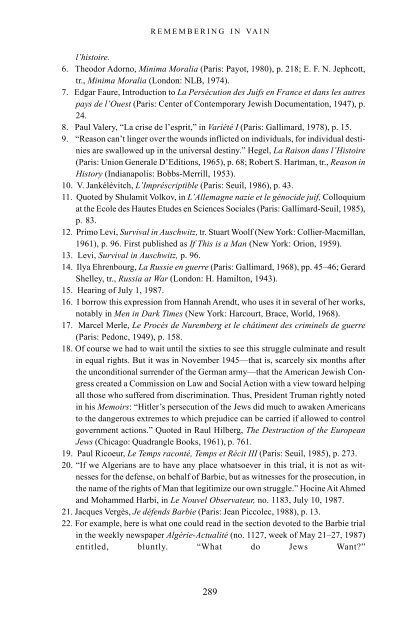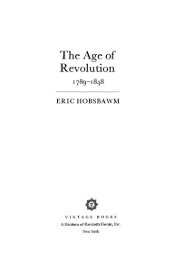The_Holokaust_-_origins,_implementation,_aftermath
The_Holokaust_-_origins,_implementation,_aftermath
The_Holokaust_-_origins,_implementation,_aftermath
Create successful ePaper yourself
Turn your PDF publications into a flip-book with our unique Google optimized e-Paper software.
REMEMBERING IN VAIN<br />
l’histoire.<br />
6. <strong>The</strong>odor Adorno, Minima Moralia (Paris: Payot, 1980), p. 218; E. F. N. Jephcott,<br />
tr., Minima Moralia (London: NLB, 1974).<br />
7. Edgar Faure, Introduction to La Persécution des Juifs en France et dans les autres<br />
pays de l’Ouest (Paris: Center of Contemporary Jewish Documentation, 1947), p.<br />
24.<br />
8. Paul Valery, “La crise de l’esprit,” in Variété I (Paris: Gallimard, 1978), p. 15.<br />
9. “Reason can’t linger over the wounds inflicted on individuals, for individual destinies<br />
are swallowed up in the universal destiny.” Hegel, La Raison dans l’Histoire<br />
(Paris: Union Generale D’Editions, 1965), p. 68; Robert S. Hartman, tr., Reason in<br />
History (Indianapolis: Bobbs-Merrill, 1953).<br />
10. V. Jankélévitch, L’Impréscriptible (Paris: Seuil, 1986), p. 43.<br />
11. Quoted by Shulamit Volkov, in L’Allemagne nazie et le génocide juif, Colloquium<br />
at the Ecole des Hautes Etudes en Sciences Sociales (Paris: Gallimard-Seuil, 1985),<br />
p. 83.<br />
12. Primo Levi, Survival in Auschwitz, tr. Stuart Woolf (New York: Collier-Macmillan,<br />
1961), p. 96. First published as If This is a Man (New York: Orion, 1959).<br />
13. Levi, Survival in Auschwitz, p. 96.<br />
14. Ilya Ehrenbourg, La Russie en guerre (Paris: Gallimard, 1968), pp. 45–46; Gerard<br />
Shelley, tr., Russia at War (London: H. Hamilton, 1943).<br />
15. Hearing of July 1, 1987.<br />
16. I borrow this expression from Hannah Arendt, who uses it in several of her works,<br />
notably in Men in Dark Times (New York: Harcourt, Brace, World, 1968).<br />
17. Marcel Merle, Le Procès de Nuremberg et le châtiment des criminels de guerre<br />
(Paris: Pedonc, 1949), p. 158.<br />
18. Of course we had to wait until the sixties to see this struggle culminate and result<br />
in equal rights. But it was in November 1945—that is, scarcely six months after<br />
the unconditional surrender of the German army—that the American Jewish Congress<br />
created a Commission on Law and Social Action with a view toward helping<br />
all those who suffered from discrimination. Thus, President Truman rightly noted<br />
in his Memoirs: “Hitler’s persecution of the Jews did much to awaken Americans<br />
to the dangerous extremes to which prejudice can be carried if allowed to control<br />
government actions.” Quoted in Raul Hilberg, <strong>The</strong> Destruction of the European<br />
Jews (Chicago: Quadrangle Books, 1961), p. 761.<br />
19. Paul Ricoeur, Le Temps raconté, Temps et Récit III (Paris: Seuil, 1985), p. 273.<br />
20. “If we Algerians are to have any place whatsoever in this trial, it is not as witnesses<br />
for the defense, on behalf of Barbie, but as witnesses for the prosecution, in<br />
the name of the rights of Man that legitimize our own struggle.” Hocine Ait Ahmed<br />
and Mohammed Harbi, in Le Nouvel Observateur, no. 1183, July 10, 1987.<br />
21. Jacques Vergès, Je défends Barbie (Paris: Jean Piccolec, 1988), p. 13.<br />
22. For example, here is what one could read in the section devoted to the Barbie trial<br />
in the weekly newspaper Algérie-Actualité (no. 1127, week of May 21–27, 1987)<br />
entitled, bluntly. “What do Jews Want”<br />
289



